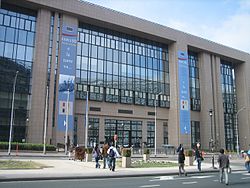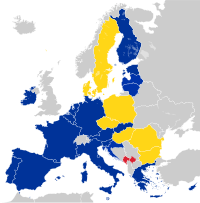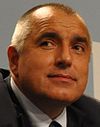European Council: Difference between revisions
infobox |
website |
||
| Line 10: | Line 10: | ||
| [[European Union|EU]] [[Institutions of the European Union|institution]] |
| [[European Union|EU]] [[Institutions of the European Union|institution]] |
||
|- |
|- |
||
| style="background:#ccccff" | President |
| style="background:#ccccff" | [[President of the European Council|President]] |
||
| [[Herman van Rompuy]] |
| [[Herman van Rompuy]] |
||
|- |
|- |
||
| style="background:#ccccff" | Seat |
| style="background:#ccccff" | Seat |
||
| [[Justus Lipsius building]], [[Brussels]] |
| [[Justus Lipsius building]], [[Brussels]] |
||
|- |
|||
| style="background:#ccccff" | Website |
|||
| [http://www.european-council.europa.eu european-council.europa.eu] |
|||
|- |
|- |
||
| colspan=2 align=center | [[File:Justus Lipsius tout le nord-est 689 MOD.jpg|200px|The Justus Lipsius building]] |
| colspan=2 align=center | [[File:Justus Lipsius tout le nord-est 689 MOD.jpg|200px|The Justus Lipsius building]] |
||
Revision as of 18:13, 11 February 2010
| European Council | |
| Established | 1961 (informally) 2009 (formally) |
| Type | EU institution |
| President | Herman van Rompuy |
| Seat | Justus Lipsius building, Brussels |
| Website | european-council.europa.eu |

| |
| This article is part of a series on |
 |
|---|
|
|
The European Council is the highest political authority of the European Union.[1]. The Treaty on European Union lists the European Council as the second institution of the European Union.[1] It comprises the heads of state or government of the Union's member states, along with its President and the President of the Commission. The High Representative takes part in its meetings, which are chaired by its President:[1] currently Herman Van Rompuy.
While the European Council has no formal legislative power, it is an institution that deals with major issues and any decisions made are "a major impetus in defining the general political guidelines of the European Union". The Council meets at least twice every six months;[1] usually in the Justus Lipsius building, the headquarters of the Council of the European Union of Brussels.[2][3][4]
History
The first Councils were held in February and July 1961 (in Paris and Bonn respectively). They were informal summits of the leaders of the European Community and were started due to then-French President Charles de Gaulle's resentment at the domination of supranational institutions (e.g. the European Commission) over the integration process. The first influential summit was held in 1969 after a series of irregular summits. The Hague summit of 1969 reached an agreement on the admittance of the United Kingdom into the Community and initiated foreign policy cooperation (the European Political Cooperation) taking integration beyond economics.[1][5]
The summits were only formalised in the period between 1974 and 1988. At the December summit in Paris in 1974, following a proposal from then-French President Valéry Giscard d'Estaing, it was agreed that more intergovernmental, political input was needed following the "empty chair crisis" and economic problems. The inaugural Council, as it had become, was held in Dublin on 3 October and 3 November 1975 during Ireland's first Presidency of the Council of the European Union. In 1987, it was included in the treaties for the first time (the Single European Act) and had a defined role for the first time in the Maastricht Treaty. At first only two meetings per year were required, now there are on average four European Councils each year (two per presidency). The seat of the Council was formalised in 2002, basing it in Brussels. In addition to usual councils, there are the occasional extraordinary councils as for example in 2001 when the European Council gathered to lead the EU's response to the September 11 attacks.[1][5]
The meetings of the Council are seen by some as turning points in the history of the European Union. For example:[1]
- 1969, The Hague: Foreign policy and enlargement.
- 1974, Paris: Creation of the Council.
- 1985, Milan: Initiate IGC leading to the Single European Act.
- 1991, Maastricht: Agreement on the Maastricht Treaty.
- 1993, Copenhagen: Leading to the definition of the Copenhagen Criteria.
- 1997, Amsterdam: Agreement on the Amsterdam Treaty.
- 1998, Brussels: Selected member states to adopt the euro.
- 1999; Cologne: Declaration on military forces.[6]
- 1999, Tampere: Institutional reform
- 2000, Lisbon: Lisbon Strategy
- 2002, Copenhagen: Agreement for May 2004 enlargement.
- 2007, Lisbon: Agreement on the Lisbon Treaty.
- 2009, Brussels: Appointment of first President and merged High Representative.
As such, the European Council had already existed before it gained the status as an institution of the European Union with the entering into force of the Treaty of Lisbon. Article 2 of this treaty officially introduces the term European Council as a substitute for the phrase "Council [of the European Union] meeting in the composition of the Heads of State or Government", which was previously used in the treaties to refer to this body.[7]
The Treaty of Lisbon made the European Council a formal institution distinct from the Council of the EU, and created the present permanent presidency. As an outgrowth of the Council of the EU, the European Council followed the same Presidency by rotating between each member state. While the Council of the EU retains that system, the European Council established, with no change in powers, a system of appointing an individual (without them being a national leader) for two-and-a-half-years.[8] Following the ratification of the treaty in December 2009, the European Council elected its first President: Herman Van Rompuy, indicating a desire for the post to be an inoffensive consensus broker.[9]
Powers and functions
The European Council is an official institution of the EU, mentioned by the Lisbon Treaty as a body which "shall provide the Union with the necessary impetus for its development". Essentially it defines the EU's policy agenda and has thus been considered to be the motor of European integration. It does this without any formal powers, only the influence it has being composed of national leaders.[1][3] Beyond the need to provide "impetus", the Council has developed further roles; to "settle issues outstanding from discussions at a lower level", to lead in foreign policy - acting externally as a "collective Head of State", "formal ratification of important documents" and "involvement in the negotiation of the treaty changes".[4][5]
Since the institution is composed of national leaders, it gathers the executive power of the member states and has thus a great influence outside established areas as for example foreign policy. It also exercises the some executive powers such as the appointment of its own President, the President of the European Commission, and the High Representative. Moreover, the European Council influences police and justice planning, the composition of the Commission, matters relating to the rotating presidency, the suspension of membership rights, and changing the voting systems in the treaties bridging clauses. Although the European Council gains no legislative power, under the "emergency break" procedure, a state outvoted in the Council of Ministers may refer contentious legislation to the European Council. However, the state may still be outvoted in the European Council.[8][10][11] Hence with powers over the supranational executive of the EU, in addition to its other powers, the European Council has been described by some as the Union's "supreme political authority".[4][5][8][12]
Composition

The European Council consist of the heads of state or government of the member states, alongside its own President and the Commission President (non-voting). The meetings used to be regularly attended by the national foreign minister as well, and the Commission President likewise is accompanied by another member of the Commission. However, since the Treaty of Lisbon reclassified inter-member state relations as domestic rather than international politics, foreign ministers are no longer regular attendees. When present though, these are the attendants seen in the "family photo" taken at each Council.[1][3][4]
Meetings can also include other leading national positions (e.g., the French Prime Minister), as required. The Secretary-General of the Council is also a regular attendee as is their deputy; the position had become highly important due to its regular role in organising the meetings while also (before the Lisbon treaty took effect) acting as the High Representative. The President of the European Parliament usually attends to give an opening speech outlining the European Parliament's position before talks begin.[1][3][4]
Additionally, the negotiations involve a large number of other people working behind the scenes. Most of those people, however, are not allowed to the conference room, except for two delegates per state to relay messages. At the push of a button members can also call for advice from a Permanent Representative via the "Antici Group" in an adjacent room. The group is composed of diplomats and assistants who convey information and requests. Interpreters are also required for meetings as members are permitted to speak in their own languages.[1]
As the composition is not precisely defined, some states which have a considerable division of executive power can find it difficult to decide who should attend the meetings. While an MEP, Alexander Stubb argued that there was no need for the President of Finland to attend Council meetings with or instead of the Prime Minister of Finland (who was head of European foreign policy).[13] In 2008, having become Finnish Foreign Minister, Stubb was forced out of the Finnish delegation to the emergency council meeting on the Georgian crisis because the President wanted to attend the high profile summit as well as the Prime Minister (only two people from each country can attend the meetings). This was despite Stubb being head of the Organisation for Security and Co-operation in Europe at the time which was heavily involved in the crisis. Problems also occurred in Poland where the President of Poland and the Prime Minister of Poland were of different parties and had a different foreign policy response to the crisis.[14]
President

The President of the European Council, currently Herman Van Rompuy, is elected for a once-renewable term of two and a half years. The role as President-in-Office is in no sense equivalent to an office of a head of state, merely a primus inter pares (first among equals) role among other European heads of government. The President-in-Office is primarily responsible for preparing and chairing the Council meetings, and has no executive powers. The position offers external representation of the European Council and the EU and reports to the European Parliament after Council meetings as well as at the beginning and end of the Presidency.[4][12]
The post was created by the Treaty of Lisbon and was subject to a debate over its exact role. Prior to Lisbon, the Presidency rotated in accordance with the Presidency of the Council of the European Union.[4][12] The leader of the Council Presidency country does still act as President when the permanent president is absent.
Council members
Political parties

Almost all members of the Council are members of a political party at national level, and most of these are members of a European-level political party. However the Council is composed in order to represent the EU's states rather than political parties and decisions are generally made on these lines. However their ideological alignment does colour their political agreements and their choice of appointments (such as their President).
The table below outlines the number of leaders affiliated to each party and their total voting weight. The map to the right indicates the alignment of each individual country.
Template:European Council standings
Seat and meetings

Meetings of the council usually take place four times a year (two per Presidency) in Brussels and last for two days, although this can sometimes be longer if contentious issues are on the agenda.[1] Up until 2002, the venue of the council meeting rotated between member states, as its location was decided by the country holding the rotating presidency. However, the 22nd declaration attached to the Treaty of Nice stated that; "As from 2002, one European Council meeting per Presidency will be held in Brussels. When the Union comprises 18 members, all European Council meetings will be held in Brussels."[17]
So between 2002 and 2004 half the councils were held in Brussels, and from the 2004 enlargement, all were. The European Council uses the same building as the Council of the European Union (the Justus Lipsius building). However some extraordinary councils still take place outside of the city in the member holding the Presidency; (Rome, 2003 or Hampton Court Palace in 2005). The European Council is due to move with the Council of the European Union to a new building, Résidence Palace, next to the existing building.[5][18]
The choice of a single seat was due to a number of factors, such as the experience of the Belgian police in dealing with protesters (a protester in Gothenburg was shot by police) as well as Brussels having fixed facilities for the Council and journalists at every meeting. By having a permanent seat (that's the same as the Council), particularly since enlargement, it was expected the Council would integrate further into the Community framework, rather than continuing under heavy national influence, developing as a governmental body (some have argued it is already the de facto EU government).[5]
In 2007 the new situation became a source of contention with the European Council wanting to sign the Lisbon Treaty in Lisbon. However the Belgian government, keen not to set a precedent, insisted that the actual meeting take place in Brussels as usual. This would mean that after the signing, photo suit and formal dinner the entire summit would transfer from Lisbon to Brussels to continue with normal business. The idea of such an eventuality, mirrored with the "travelling circus" of the European Parliament, garnered protests from environmental groups describing the hypocrisy of demanding lower carbon emissions while flying across Europe for the same summit for political reasons.[19]
References
- ^ a b c d e f g h i j k l "Spanish Presidency Website". Cite error: The named reference "seeToL" was defined multiple times with different content (see the help page).
- ^ "European Council". Council of the European Union. Retrieved 2007-07-12.
{{cite web}}: Cite has empty unknown parameter:|coauthors=(help) - ^ a b c d "Consolidated versions of the treaty on European Union and of the treaty establishing the European Community" (PDF). Europa (web portal). 1992-02-07. Retrieved 2007-07-12.
{{cite web}}: Cite has empty unknown parameter:|coauthors=(help) - ^ a b c d e f g "European Council". Europa (web portal). Retrieved 2007-07-12.
{{cite web}}: Cite has empty unknown parameter:|coauthors=(help) - ^ a b c d e f Stark, Christine. "Evolution of the European Council: The implications of a permanent seat" (PDF). Dragoman.org. Retrieved 2007-07-12.
{{cite web}}: Cite has empty unknown parameter:|coauthors=(help) - ^ "EU Security Policy & the role of the European Commissio". European Commission. Retrieved 2007-08-22.
{{cite web}}: Cite has empty unknown parameter:|coauthors=(help) - ^ Wikisource: Article 2, Treaty of Lisbon
- ^ a b c "The Union's institutions: The European Council". Europa (web portal). 2001-02-21. Retrieved 2007-07-12.
{{cite web}}: Cite has empty unknown parameter:|coauthors=(help) - ^ "BBC News - Belgian PM Van Rompuy is named as new EU president". Retrieved 2009-11-20.
- ^ Peers, Steve (2007-08-02). "EU Reform Treaty Analysis no. 2.2: Foreign policy provisions of the revised text of the Treaty on the European Union (TEU)" (PDF). Statewatch. Retrieved 2007-09-26.
{{cite web}}: Cite has empty unknown parameter:|coauthors=(help) - ^ Peers, Steve (2007-08-02). "EU Reform Treaty analysis 1: JHA provisions" (PDF). Statewatch. Retrieved 2007-09-26.
{{cite web}}: Cite has empty unknown parameter:|coauthors=(help) - ^ a b c "How does the EU work". Europa (web portal). Retrieved 2007-07-12.
{{cite web}}: Cite has empty unknown parameter:|coauthors=(help) - ^ "Finnish Conservatives name Stubb foreign minister". new Room Finland. 2008-04-01. Retrieved 2008-04-01.
- ^ Phillips, Leigh (2008-08-29). "Spats over who gets to go to EU summit break out in Poland, Finland". EU Observer. Retrieved 2008-09-01.
- ^ Party holds only observer status with the Party of the European Left
- ^ a b c English media dub the post as Prime Minister
- ^ "Treaty of Nice" (PDF). Europa (web portal). 2001-02-21. Retrieved 2007-07-12.
{{cite web}}: Cite has empty unknown parameter:|coauthors=(help) - ^ "Reconstruction of "Residence Palacel". UIA Architectes. 2005-09-26. Retrieved 2007-07-12.
{{cite web}}: Cite has empty unknown parameter:|coauthors=(help) - ^ ley Berry, Peter Sain (2007-11-01). "Comment: Travelling circuses are not worth the carbon". EU Observer. Retrieved 2007-11-01.
{{cite web}}: Cite has empty unknown parameter:|coauthors=(help)
































